#several accounts of murder
Text
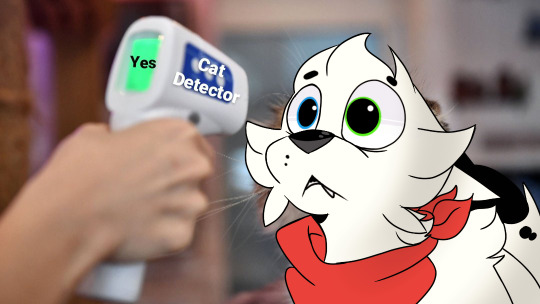

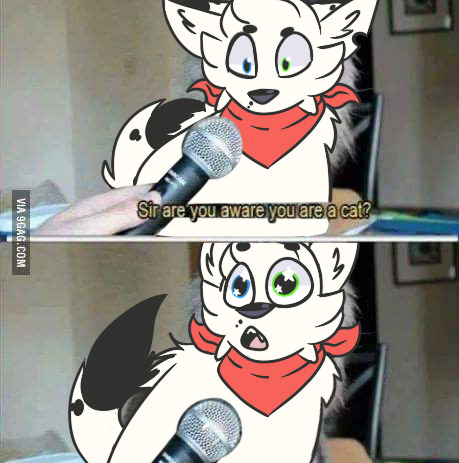

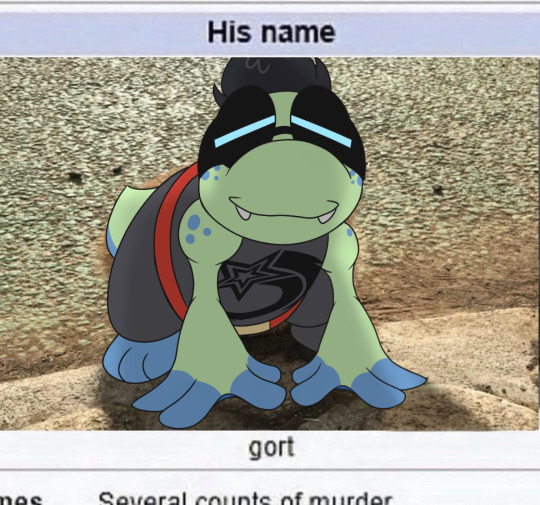
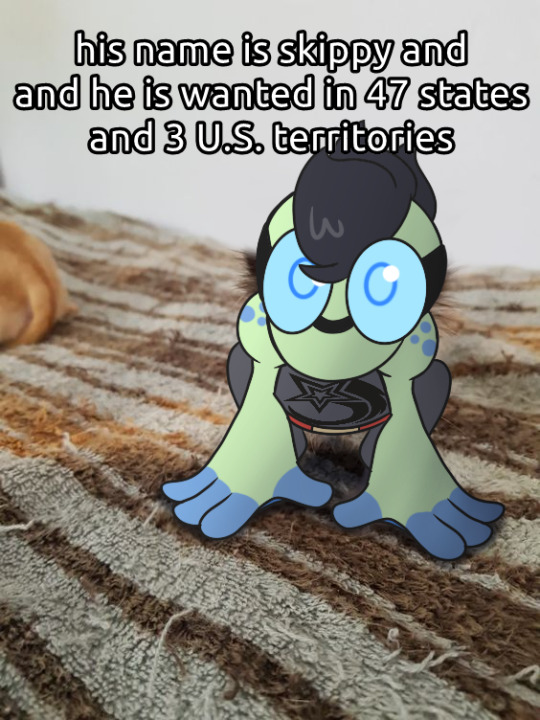
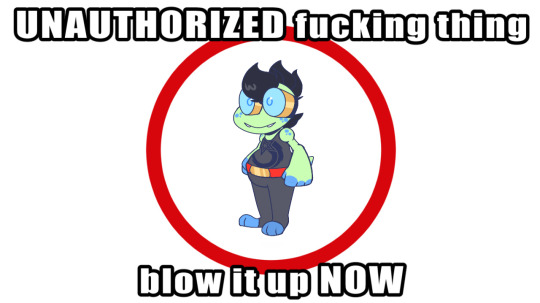
Now that it's 3am I'm gonna share memes I did during a fit of art block starring your local cat-dog and frog-thing before I go to bed
#ruckis vandalizes#non fandom oc#fursona#sona#furry#scalie#frog furry#geragera guffaw#ruckis kingstarr#cat detector#sir are you aware you are a cat?#his name#gort#crimes#several accounts of murder#whats your fucking problem#why are you acting like this#his name is skippy and he is wanted in 47 states and 3 u.s. territories#unathorized fucking thing#blow it up now#meme#shitpost#shit post#draw over#order of the stars
14 notes
·
View notes
Text
Doing a little math again because I'm legit insane ✨✨ about Light Yagami ✨✨✨
THESE ARE ESTIMATES AND GUESSES DON'T COME FOR ME but I wanted to see how many people he'd killed by the time the broadcast happened!
I counted all the names on that one manga panel—thirty-two lines with four columns per row, which puts us at 128 names per page. There are obviously pages before the ones Light shoves in front of Ryuk, so that's already over 236 people dead.
Then the police say that all of Kira's kills are between the hours of 4:00pm and 2:00am—eleven hours total.
The average person can write anywhere from five to twenty words per minute; I took a guess and went with the upper bit of sixteen words per minute being Light's writing speed. NOW with this hypothesis (doing science in my DN headcanons now, watch me if-then), accounting for any breaks Light might have taken from writing between those hours by knocking two whole hours off altogether and making it a nice nine, given that he's shown to develop a bout of insomnia for that period—but not accounting for any names that are more or less words than two (which brings up the interesting question of if Light would need someone's middle name to kill them...hmm questions for another post)—Light fills about three and three quarters of pages per hour. That's 480 names per hour.
480 names an hour for nine hours is 4,320 names a day.
So in the frantic panicked haze Light would've been in during those five days before Ryuk showed up and told him he wouldn't be dying, Light likely killed somewhere around 21,600 people.
It slows drastically after this, because Light begins to calm down and think his kills through more thoroughly, developing an actual plan of action to justify all the people he's now killed. He starts getting proper sleep again, and likely does a lot more research because the "worst of the worst" (at least those in public eye) have already fallen under his pen. They had to have, given the number of them he nerfed in those first five days.
So he puts his sleep schedule back in place, starts doing more thorough research; that knocks his time down to about six hours a day to write names, give or take depending on the day. After Ryuk appears, there's only two more days before the broadcast. In those two days, using my prior calculations, Light likely killed around 5,760 additional people in those two days.
Putting his kill count as of the Lind. L. Tailor broadcast at a little over 27,000 people :D
(Then of course he levels out to twenty-four people per day once it comes out that L thinks Kira is a student, which is a FAR more drastic change from fucking over 4,000 per day. Really highlights how his priorities switched from cleaning the world to playing his fun new game with L lmao).
Do with this what you will ✨✨✨
#this of course does not account for several factors#longer names that then take uo more time#shorter names that take up less time#that might actually balance out but who really knows#basing this all on literally two (2) panels from the manga probably isnt accurate but eh#i had fun#death note#yagami light#light yagami#tw murder#tw math#said manga panels also slightly disprove this bc the Before pages light was holding definitely do not add up to what they should lmao#theres like seven pages there and with this it should be closer to 200 :'D#so dpending on how you like your light he couldve either killed 896 people or 21600 people byt the time he meets ryuk#choices choices ✨💕
24 notes
·
View notes
Text
I realize I am a full day late in saying this, but I really appreciate that g witch is just murdering any straight pairing on sight
happy pride
#g witch spoilers#what was it that dumb twitter account said#the pairing isn't present this week??? yeah well NEITHER ARE ANY OF THE STRAIGHTS ANYMORE.#g witch#the witch from mercury#the witch from mercury spoilers#(it just is really hilarious that norea was murdered the SECOND she considered letting go of mourning sophie and choosing the man#who had basically been stalking her for several episodes. shoot your shot INDEED.)
55 notes
·
View notes
Text
I love it when he just:

Ya'know?
#spamton g spamton#spampton#DELTARUNE#Undertale#utdr#safe utdr#gay#gay little guys#gay little man#he's wanted for tax evasion#arson#vehicular manslaughter#war crimes#10 accounts of third degree murder#and several more
16 notes
·
View notes
Text
i love posting about a show that none of u followed me for, for a solid month. i am going to complain about things that you have no context for and that's just the way it has to be. anyway. I love the dynamics in 3zun and im obsessed with the Vibes but trying to find good Content for them is fucking impossible if you happen to actually like nie mingjue 💀 based on the vibes you get about jgy and nmj from ao3 and fans on this website you would nEVER guess which one tortured and murdered the other LMAO
#bitch i swear. none of these 3zun writers actually even like him#it's really weird! like they genuinely hate the guy. why is he here in the fic and the relationship then!!#it literally seems like the only reason it's tagged as 3zun and not as xiyao is because they want nmj there to bash him. it's insane#jgy pulled the equivalent of switching out nmjs IV bag and filling it with poison for months until his brain actually exploded.#obv i LOVE that kind of relationship#aljfljkdas the succession line of Hey Do You Really Want To Do A Full Accounting Of All The Pain In Our Relationship? line comes to mind#when im reading these fics. god bless#nmj: i am sorry for not taking class into account when evaluating your daily life and for kicking you down those stairs.#jgy: i am sorry for killing several of your disciples in cold blood; torturing you; and murdering you horrifically in front of your brother#like. guys#what are we doing here DLKJDSKJGHKSDLF
38 notes
·
View notes
Text

Crime besties <3
#oc shit#original character#alien oc#space oc#Tyzian Grey#Beiste#they’ve both committed several accounts of murder#canonically#space fucks
3 notes
·
View notes
Text

they will NOT stop callin pro-palestinians nazis in my notes and its so weird. like can yall get a hobby other than getting mad at people for saying genocide is bad
#like is it so difficult to just be like#wow yeah israel is killing people and that is bad!#wow yeah israel is creating propaganda to insist that this is intrinsically a jewish thing when in reality its just an israel thing!#and they just don't wanna take accountability so they cry antisemitism every time someone criticizes them!#which btw is severely negatively affecting jewish people all around the world#something i have witnessed firsthand in fact!#so like zionists fuck off and stop pretending you're the victim here#people are being killed#children are being killed#infants are being killed#mothers and fathers and entire families are being killed#theyre being brutally murdered by occupation forces but noooo you've gotta whine about how you personally are being victimized#by people saying “hey can we maybe not do a fucking genocide?”
2 notes
·
View notes
Text
@beatingheart-bride
"Dorian! Your bride-to-be is here!"
"Lizzie...?" Dorian mumbled tiredly under his breath, eyes snapping awake when his mother's shrill voice pierced his tired brain, her trilling announcement of the de Clair's arrival being followed by her encouraging him to "sit up, sit up!" (having seen her son slouching sleepily, not at all heeding why) as Beau let their guests into the dining room, the long table having been cleared quickly from breakfast to make way for a sumptuous brunch spread-one where a bottle of red wine was more than welcome.
"Etta, Francis, you're much too kind!" Mr. Gracey beamed, happily accepting the bottle, while Mrs. Gracey urged Beau to go and fetch the good crystal so that they could all break open the bottle and share in a toast. Dorian, now slightly more awake, was kind enough to add a quiet "please" to the end of the request, something that made Beau smile at the young master as he passed by, while Dorian himself got out of his seat to greet their guests, in particular Emily, flashing her a tired, if still kind, smile.
"Tell me at least one of us slept well last night," he joked, tone a touch apologetic-if he fell asleep during the proceedings regarding the wedding planning, he wanted to apologize beforehand; it was a miracle he was able to stand upright, honestly.
#((true; even nicholas isn't dumb enough to try and fight four people at once!))#((hell it actually *won't* be four; it'll be six! on account of mrs. henshaw and beau!))#((and you're absolutely right; unlike him; they *aren't* murderers; they won't stoop to his lows!))#((so yeah; admittedly i'm leaning a bit towards nicholas walking away from the fight alive))#((but with his pride severely wounded and his reputation in tatters!))#((and honestly; that's a fate worse than death to him; i'm sure! being shunned by the elite))#((*and* having lost out on the de clair fortune? that's no doubt worse to him))#((than being killed; and it allows him to suffer longer; i think!))#outofhatboxes#beatingheart-bride#V:Days of Future Past
6 notes
·
View notes
Text
when my sister worked at wendy’s she had a manager that was an alcoholic and would be sitting at his desk in the back puking in a trash can every night going through alcohol withdrawals. he also lived in a tent in his mom’s front lawn with his girlfriend because he lived with his mom and the mom “wasn’t comfortable” with the girlfriend being inside the house. and he was in his mid-to-late thirties too. and i can’t remember if it was him or the other guy who would tell everyone who worked the drive thru to drop customers’ change on the ground on purpose but make it look like an accident because most of the time they wouldn’t bother picking it up and then he could go out later after they closed and grab it himself. the other guy also told her that testing positive for covid and showing proof of that “wasn’t an excuse” and he expected her to come in to work anyway. and this wendy’s is of course also where she met not only KEVIN but also kevin’s cousin who recently got arrested for killing a guy
#there was another manager who was like 29 and she would flirt with the high school boys that got hired#and then she got fired and burger king immediately hired her as a manager there#and kevin works at cookout now. he’s still not even a manager#he still can’t drive. he’s like almost 28 i think. he owes several thousand dollars in rent even though it’s only $500 a month#and he makes like $2000 a month at cookout but he spends it all on weed which is not legal here due to sc being one of the worst states ever#and i still haven’t even met him on account of if i do i will kill him instantly and everyone knows this#all the local fast food places are literally just passing around the worst managers & employees possible#like the world’s most pathetic and fucked up blunt it’s so sad#oh yeah AND kevin’s ex-wife after they broke up got with another guy. had a baby. and then they both went to jail for killing it#and she used to work at wendy’s also. literally multiple people who used to work at that wendy’s with my sister are now in jail for murder
5 notes
·
View notes
Text
The director of the New York Office of the High Commissioner for Human Rights of the UN (UN OHCHR), Craig Mokhiber, has resigned in a letter dated 28 October 2023
the resignation letter can be found embedded in this tweet by Rami Atari (@.Raminho) dated 31 October 2023.
The letters are here:
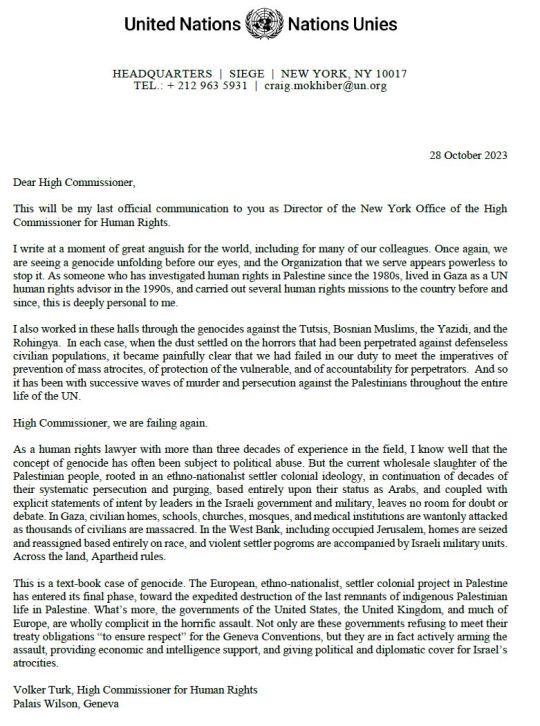
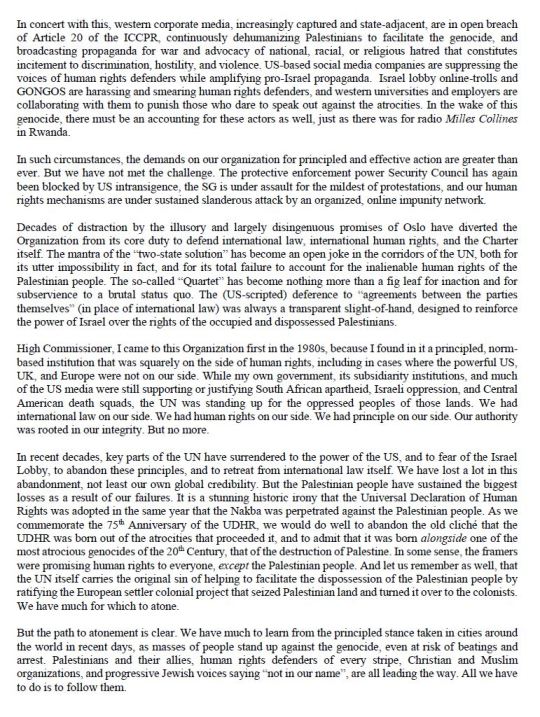
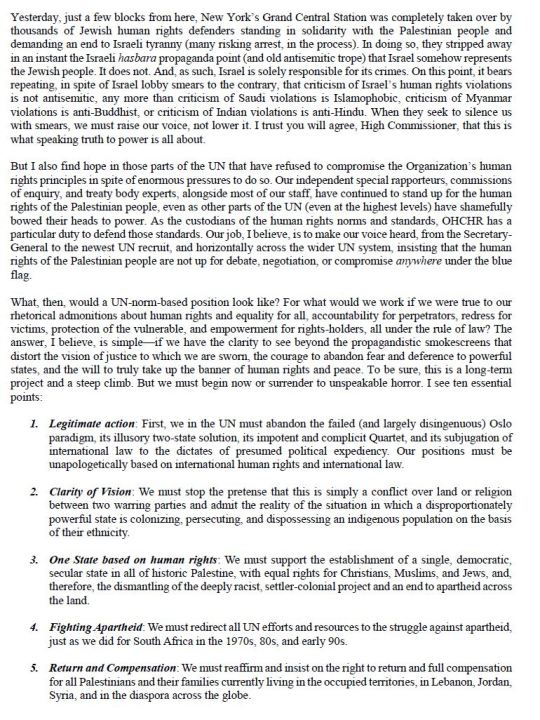
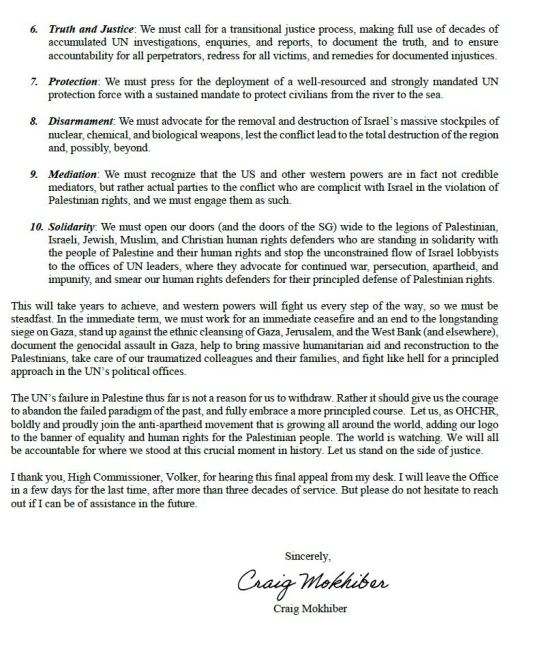
Transcription:
United Nations | Nations Unies
HEADQUARTERS I SIEGE I NEW YORK, NY 10017
28 October 2023
Dear High Commissioner,
This will be my last official communication to you as Director of the New York Office of the High Commissioner for Human Rights.
I write at a moment of great anguish for the world, including for many of our colleagues. Once again, we are seeing a genocide unfolding before our eyes, and the Organization that we serve appears powerless to stop it. As someone who has investigated human rights in Palestine since the 1980s, lived in Gaza as a UN human rights advisor in the 1990s, and carried out several human rights missions to the country before and since, this is deeply personal to me.
I also worked in these halls through the genocides against the Tutsis, Bosnian Muslims, the Yazidi, and the Rohingya. In each case, when the dust settled on the horrors that had been perpetrated against defenseless civilian populations, it became painfully clear that we had failed in our duty to meet the imperatives of prevention of mass atrocites, of protection of the vulnerable, and of accountability for perpetrators. And so it has been with successive waves of murder and persecution against the Palestinians throughout the entire life of the UN.
High Commissioner, we are failing again.
As a human rights lawyer with more than three decades of experience in the field, I know well that the concept of genocide has often been subject to political abuse. But the current wholesale slaughter of the Palestinian people, rooted in an ethno-nationalist settler colonial ideology, in continuation of decades of their systematic persecution and purging, based entirely upon their status as Arabs, and coupled with explicit statements of intent by leaders in the Israeli government and military, leaves no room for doubt or debate. In Gaza, civilian homes, schools, churches, mosques, and medical institutions are wantonly attacked as thousands of civilians are massacred. In the West Bank, including occupied Jerusalem, homes are seized and reassigned based entirely on race, and violent settler pogroms are accompanied by Israeli military units. Across the land, Apartheid rules.
This is a text-book case of genocide. The European, ethno-nationalist, settler colonial project in Palestine has entered its final phase, toward the expedited destruction of the last remnants of indigenous Palestinian life in Palestine. What's more, the governments of the United States, the United Kingdom, and much of Europe, are wholly complicit in the horrific assault. Not only are these governments refusing to meet their treaty obligations "to ensure respect" for the Geneva Conventions, but they are in fact actively arming the assault, providing economic and intelligence support, and giving political and diplomatic cover for Israel's atrocities.
Volker Turk, High Commissioner for Human Rights Palais Wilson, Geneva
In concert with this, western corporate media, increasingly captured and state-adjacent, are in open breach of Article 20 of the ICCPR, continuously dehumanizing Palestinians to facilitate the genocide, and broadcasting propaganda for war and advocacy of national, racial, or religious hatred that constitutes incitement to discrimination, hostility, and violence. US-based social media companies are suppressing the voices of human rights defenders while amplifying pro-Israel propaganda. Israel lobby online-trolls and GONGOS are harassing and smearing human rights defenders, and western universities and employers are collaborating with them to punish those who dare to speak out against the atrocities. In the wake of this genocide, there must be an accounting for these actors as well, just as there was for radio Mules Collins in Rwanda.
In such circumstances, the demands on our organization for principled and effective action are greater than ever. But we phave not met the challenge. The protective enforcement power Security Council has again been blocked by US intransigence, the SG [UN Secretary General] is under assault for the mildest of protestations, and our human rights mechanisms are under sustained slanderous attack by an organized, online impunity network.
Decades of distraction by the illusory and largely disingenuous promises of Oslo have diverted the Organization from its core duty to defend international law, international human rights, and the Charter itself. The mantra of the "two-state solution" has become an open joke in the corridors of the UN, both for its utter impossibility in fact, and for its total failure to account for the inalienable human rights of the Palestinian people. The so-called "Quartet" has become nothing more than a fig leaf for inaction and for subservience to a brutal status quo. The (US-scripted) deference to "agreements between the parties themselves" (in place of international law) was always a transparent slight-of-hand, designed to reinforce the power of Israel over the rights of the occupied and dispossessed Palestinians.
High Commissioner, I came to this Organization first in the 1980s, because I found in it a principled, norm-based institution that was squarely on the side of human rights, including in cases where the powerful US, UK, and Europe were not on our side. While my own government, its subsidiarity institutions, and much of the US media were still supporting or justifying South African apartheid, Israeli oppression, and Central American death squads, the UN was standing up for the oppressed peoples of those lands. We had international law on our side. We had human rights on our side. We had principle on our side. Our authority was rooted in our integrity. But no more.
In recent decades, key parts of the UN have surrendered to the power of the US, and to fear of the Israel Lobby, to abandon these principles, and to retreat from international law itself. We have lost a lot in this abandonment, not least our own global credibility. But the Palestinian people have sustained the biggest losses as a result of our failures. It is a stunning historic irony that the Universal Declaration of Human Rights was adopted in the same year that the Nakba was perpetrated against the Palestinian people. As we commemorate the 75th Anniversary of the UDHR, we would do well to abandon the old cliché that the UDHR was born out of the atrocities that proceeded it, and to admit that it was born alongside one of the most atrocious genocides of the 20th Century, that of the destruction of Palestine. In some sense, the framers were promising human rights to everyone, except the Palestinian people. And let us remember as well, that the UN itself carries the original sin of helping to facilitate the dispossession of the Palestinian people by ratifying the European settler colonial project that seized Palestinian land and turned it over to the colonists. We have much for which to atone.
But the path to atonement is clear. We have much to learn from the principled stance taken in cities around the world in recent days, as masses of people stand up against the genocide, even at risk of beatings and arrest. Palestinians and their allies, human rights defenders of every stripe, Christian and Muslim organizations, and progressive Jewish voices saying "not in our name", are all leading the way. All we have to do is to follow them.
Yesterday, just a few blocks from here, New York's Grand Central Station was completely taken over by thousands of Jewish human rights defenders standing in solidarity with the Palestinian people and demanding an end to Israeli tyranny (many risking arrest, in the process). In doing so, they stripped away in an instant the Israeli hasbara propaganda point (and old antisemitic trope) that Israel somehow represents the Jewish people. It does not. And, as such, Israel is solely responsible for its crimes. On this point, it bears repeating, in spite of Israel lobby smears to the contrary, that criticism of Israel's human rights violations is not antisemitic, any more than criticism of Saudi violations is Islamophobic, criticism of Myanmar violations is anti-Buddhist, or criticism of Indian violations is anti-Hindu. When they seek to silence us with smears, we must raise our voice, not lower it. I trust you will agree, High Commissioner, that this is what speaking truth to power is all about.
But I also find hope in those parts of the UN that have refused to compromise the Organization's human rights principles in spite of enormous pressures to do so. Our independent special rapporteurs, commissions of enquiry, and treaty body experts, alongside most of our staff, have continued to stand up for the human rights of the Palestinian people, even as other parts of the UN (even at the highest levels) have shamefully bowed their heads to power. As the custodians of the human rights norms and standards, OHCHR. has a particular duty to defend those standards. Our job, I believe, is to make our voice heard, from the Secretary-General to the newest UN recruit, and horizontally across the wider UN system, incisting that the human rights of the Palestinian people are not up for debate, negotiation, or compromise anywhere under the blue flag.
What, then, would a UN-norm-based position look like? For what would we work if we were true to our rhetorical admonitions about human rights and equality for all, accountability for perpetrators, redress for victims, protection of the vulnerable, and empowerment for rights-holders, all under the rule of law? The answer, I believe, is simple—if we have the clarity to see beyond the propagandistic smokescreens that distort the vision of justice to which we are sworn, the courage to abandon fear and deference to powerful states, and the will to truly take up the banner of human rights and peace. To be sure, this is a long-term project and a steep climb. But we must begin now or surrender to unspeakable horror. I see ten essential points:
Legitimate action: First, we in the UN must abandon the failed (and largely disingenuous) Oslo paradigm, its illusory two-state solution, its impotent and complicit Quartet, and its subjugation of international law to the dictates of presumed political expediency. Our positions must be unapologetically based on international human rights and international law.
Clarity of Vision: We must stop the pretense that this is simply a conflict over land or religion between two warring parties and admit the reality of the situation in which a disproportionately powerful state is colonizing, persecuting, and dispossessing an indigenous population on the basis of their ethnicity.
One State based on human rights: We must support the establishment of a single, democratic, secular state in all of historic Palestine, with equal rights for Christians, Muslims, and Jews, and, therefore, the dicmantling of the deeply racist, settler-colonial project and an end to apartheid across the land.
Fighting Apartheid: We must redirect all UN efforts and resources to the struggle against apartheid, just as we did for South Africa in the 1970s, 80s, and early 90s.
Return and Compensation: We must reaffirm and insist on the right to return and full compensation for all Palestinians and their families currently living in the occupied territories, in Lebanon, Jordan, Syria, and in the diaspora across the globe.
Truth and Justice: We must call for a transitional justice process, making full use of decades of accumulated UN investigations, enquiries, and reports, to document the truth, and to ensure accountability for all perpetrators, redress for all victims, and remedies for documented injustices.
Protection: We must press for the deployment of a well-resourced and strongly mandated UN protection force with a sustained mandate to protect civilians from the river to the sea.
Disarmament: We must advocate for the removal and destruction of Israel's massive stockpiles of nuclear, chemical, and biological weapons, lest the conflict lead to the total destruction of the region and, possibly, beyond.
Mediation: We must recognize that the US and other western powers are in fact not credible mediators, but rather actual parties to the conflict who are complicit with Israel in the violation of Palestinian rights, and we must engage them as such.
Solidarity: We must open our doors (and the doors of the SG) wide to the legions of Palestinian, Israeli, Jewish, Muslim, and Christian human rights defenders who are standing in solidarity with the people of Palestine and their human rights and stop the unconstrained flow of Israel lobbyists to the offices of UN leaders, where they advocate for continued war, persecution, apartheid, and impunity, and smear our human rights defenders for their principled defense of Palestinian rights.
This will take years to achieve, and western powers will fight us every step of the way, so we must be steadfast. In the immediate term, we must work for an immediate ceasefire and an end to the longstanding siege on Gaza, stand up against the ethnic cleansing of Gaza, Jerusalem, and the West Bank (and elsewhere), document the genocidal assault in Gaza, help to bring massive humanitarian aid and reconstruction to the Palestinians, take care of our traumatized colleagues and their families, and fight like hell for a principled approach in the UN's political offices.
The UN's failure in Palestine thus far is not a reason for us to withdraw. Rather it should give us the courage to abandon the failed paradigm of the past, and fully embrace a more principled course. Let us, as OHCHR, boldly and proudly join the anti-apartheid movement that is growing all around the world, adding our logo to the banner of equality and human rights for the Palestinian people. The world is watching. We will all be accountable for where we stood at this crucial moment in history. Let us stand on the side of justice.
I thank you, High Commissioner, Volker, for hearing this final appeal from my desk. I will leave the Office in a few days for the last time, after more than three decades of service. But please do not hesitate to reach out if I can be of assistance in the future.
Sincerely,
Craig Mokhiber
End of transcription.
Emphasis (bolding) is my own. I have added links, where relevant, to explanations of concepts the former Director refers to.
#Israel#Palestine#October 2023#28 October 2023#United Nations#Described#Long post#I’ll add more links to the things he is talking about later
15K notes
·
View notes
Text

The latest questions are centered around Anat Schwartz, an Israeli who co-authored several of the paper’s most widely circulated reports, including the now well-known and scrutinized December 28 article headlined: “‘Screams Without Words’’ How Hamas Weaponized Sexual Violence on Oct. 7.”
Independent researchers scrutinized the online record, and raised serious questions about Schwartz. First, she has apparently never been a reporter but is actually a filmmaker, who the Times suddenly hired in October. You would expect the paper to look for someone with actual journalistic experience, especially for a story as sensitive as this one, written during the fog of war. Surely the paper had enough of its own correspondents on staff who could have been assigned to it.
Next, the researchers found that Schwartz had not hidden her strong feelings online. There are screenshots of her “liking” certain posts that repeated the “40 beheaded baby” hoax, and that endorsed another hysterical post that urged the Israeli army to “turn Gaza into a slaughterhouse,” and called Palestinians “human animals.”
(Just this morning, more evidence emerged online; Schwartz apparently also served in Israeli Military Intelligence.)
Finally, one of her co-authors on two of the reports was Adam Sella, who is her nephew.
Let’s pause here. What would happen if the Times suddenly hired a Palestinian filmmaker with no journalistic background, who had recently publicly “liked” posts that called for “pushing Israeli Jews into the sea,” to co-write several of its most sensitive and contested reports?
[...]
There’s another related example of how the Times has botched the sexual violence story. One of the first Israeli organizations that arrived on the scene of the Hamas attack was Zaka, a volunteer group that recovers dead bodies. On January 15, Times reporter Sheena Frankel wrote a positive profile of the group; she included 3 or 4 sentences of criticism, only to quickly dismiss them. This site had already raised serious doubts about Zaka weeks earlier, pointing out that “the organization’s volunteers have systematically given false testimonies, and continue repeating them to journalists on behalf of the Israel government.” Then, on January 31, the Israeli daily Haaretz published a long investigation, that highlighted “cases of negligence, misinformation and a fundraising campaign that used the dead as props.” Haaretz cited one Zaka report that said a volunteer had seen a murdered pregnant woman, with the baby still attached by the umbilical cord — before concluding that the incident “simply didn’t happen.”
At this stage, there are serious doubts about many aspects of Israel’s overall account about October 7. Only a genuinely independent and impartial investigation might some day get closer to the truth. But meanwhile, at the very least the New York Times must publicly recognize its errors, and assign new, unbiased reporters to try to clean up its mess.
Continue reading
2K notes
·
View notes
Text
How the NYPD defeated bodycams
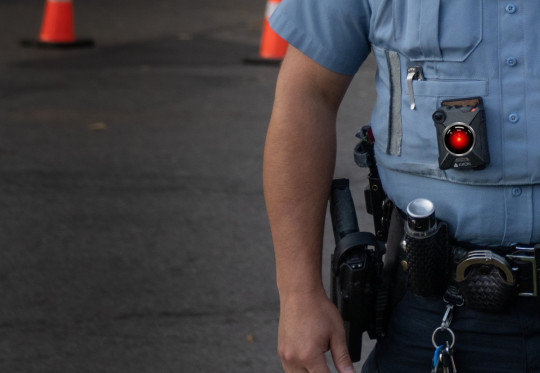
Anything that can't go on forever will eventually stop. When American patience for racial profiling in traffic stops reached a breaking point, cops rolled out dashcams. Dashcam footage went AWOL, or just recorded lots of racist, pretextual stops. Racial profiling continued.
Tasers and pepper spray were supposed to curb the undue use of force by giving cops an alternative to shooting dangerous-seeming people. Instead, we got cops who tasered and sprayed unarmed people and then shot them to pieces.
Next came bodycams: by indelibly recording cops' interactions with the public, body-worn cameras were pitched as a way to bring accountability to American law-enforcement. Finally, police leadership would be able to sort officers' claims from eyewitness accounts and figure out who was lying. Bad cops could be disciplined. Repeat offenders could be fired.
Police boosters insist that police violence and corruption are the result of "a few bad apples." As the saying goes, "a few bad apples spoil the bushel." If you think there are just a few bad cops on the force, then you should want to get rid of them before they wreck the whole institution. Bodycams could empirically identify the bad apples, right?
Well, hypothetically. But what if police leadership don't want to get rid of the bad apples? What if the reason that dashcams, tasers, and pepper spray failed is that police leadership are fine with them? If that were the case, then bodycams would turn into just another expensive prop for an off-Broadway accountability theater.
What if?
In "How Police Have Undermined the Promise of Body Cameras," Propublica's Eric Umansky and Umar Farooq deliver a characteristically thorough, deep, and fascinating account of the failure of NYPD bodycams to create the accountability that New York's political and police leadership promised:
https://www.propublica.org/article/how-police-undermined-promise-body-cameras
Topline: NYPD's bodycam rollout was sabotaged by police leadership and top NYC politicians. Rather than turning over bodycam footage to oversight boards following violent incidents, the NYPD suppresses it. When overseers are allowed to see the footage, they get fragmentary access. When those fragments reveal misconduct, they are forbidden to speak of it. When the revealed misconduct is separate from the main incident, it can't be used to discipline officers. When footage is made available to the public, it is selectively edited to omit evidence of misconduct.
NYPD policy contains loopholes that allow them to withhold footage. Where those loopholes don't apply, the NYPD routinely suppresses footage anyway, violating its own policies. When the NYPD violates its policies, it faces no consequences. When overseers complain, they are fired.
Bodycams could be a source of accountability for cops, but for that to be true, control over bodycams would have to vest with institutions that want to improve policing. If control over bodycams is given to institutions that want to shield cops from accountability, that's exactly what will happen. There is nothing about bodycams that makes them more resistant to capture than dashcams, tasers or pepper spray.
This is a problem across multiple police departments. Minneapolis, for example, has policies from before and after the George Floyd uprisings that require bodycam disclosure, and those policies are routinely flouted. Derek Chauvin, George Floyd's murderer, was a repeat offender and had been caught on bodycam kneeling on other Black peoples' necks. Chauvin once clubbed a 14 year old child into unconsciousness and then knelt on his neck for 15 minutes as his mother begged for her child's life. Chauvin faced no discipline for this and the footage was suppressed.
In Montgomery, Alabama, it took five years of hard wrangling to get access to bodycam footage after an officer sicced his attack dog on an unarmed Black man without warning. The dog severed the man's femoral artery and he died. Montgomery PD suppressed the footage, citing the risk of officers facing "embarrassment."
In Memphis, the notoriously racist police department was able to suppress bodycam disclosures until the murder of Tyre Nichols. The behavior of the officers who beat Nichols to death are a testament to their belief in their own impunity. Some officers illegally switched off their cameras; others participated in the beating in full view of the cameras, fearing no consequences.
In South Carolina, the police murder of Walter Scott was captured on a bystander's phone camera. That footage made it clear that Scott's uniformed killers lied, prompting then-governor Nikki Haley to sign a law giving the public access to bodycam footage. But the law contained a glaring loophole: it made bodycam footage "not a public record subject to disclosure." Nothing changed.
Bodycam footage does often reveal that killer cops lie about their actions. When a Cincinnati cop killed a Black man during a 2015 traffic-stop, his bodycam footage revealed that the officer lied about his victim "lunging at him" before he shot. Last summer, a Philadelphia cop was caught lying about the circumstances that led to him murdering a member of the public. Again, the officer claimed the man had "lunged at him." The cop's camera showed the man sitting peacefully in his own car.
Police departments across the country struggle with violent, lying officers, but few can rival the NYPD for corruption, violence, scale and impunity. The NYPD has its own "goon squad," the Strategic Response Group, whose leaked manual reveals how the secret unit spends about $100m/year training and deploying ultraviolent, illegal tactics:
https://pluralistic.net/2021/04/07/cruelty-by-design/#blam-blam-blam
The NYPD's disciplinary records – published despite a panicked scramble to suppress them – reveal the NYPD's infestation with criminal cops who repeatedly break the law in meting out violence against the public:
https://pluralistic.net/2020/07/27/ip/#nypd-who
These cops are the proverbial bad apples, and they do indeed spoil the barrel. A 2019 empirical analysis of police disciplinary records show that corruption is contagious: when crooked cops are paired with partners who have clean disciplinary records, those partners become crooked, too, and the effect lasts even after the partnership ends:
https://journals.sagepub.com/doi/full/10.1177/2378023119879798
Despite the risk of harboring criminals in police ranks, the NYPD goes to extreme lengths to keep its worst officers on the street. New York City's police "union"'s deal with the city requires NYC to divert millions to a (once) secret slushfund used to pay high-priced lawyers to defend cops whose conduct is so egregious that the city's own attorneys refuse to defend them:
https://pluralistic.net/2021/03/26/overfitness-factor/#heads-you-lose-tails-they-win
This is a good place for your periodic reminder that police unions are not unions:
https://pluralistic.net/2020/07/28/afterland/#selective-solidarity
Indeed, despite rhetoric to the contrary, policing is a relatively safe occupation, with death rates well below the risks to roofers, loggers, or pizza delivery drivers:
https://pluralistic.net/2022/01/27/extraordinary-popular-delusions/#onshore-havana-syndrome
The biggest risk to police officers – the single factor that significantly increased death rates among cops – is police unions themselves. Police unions successfully pressured cities across American to reject covid risk mitigation, from masking to vaccinations, leading to a wave of police deaths. "Suicide by cop" is very rare, but US officers committed "mass suicide by cop union":
https://www.nytimes.com/2021/10/12/us/police-covid-vaccines.html
But the story that policing is much more dangerous than it really is a useful one. It has a business-model. Military contractors who turn local Barney Fifes into Judge Dredd cosplayers with assault rifles, tanks and other "excess" military gear make billions from the tale:
https://pluralistic.net/2020/07/10/flintstone-delano-roosevelt/#1033-1022
It's not just beltway bandits who love this story. For cops to be shielded from consequences for murdering the public, they need to tell themselves and the rest of us that they are a "thin blue line," and not mere armed bureaucrats. The myth that cops are in constant danger from the public justifies hair-trigger killings.
Consider the use of "civilian" to describe the public. Police are civilians. The only kind of police officer who isn't a civilian is a military policeman. Places where "civilians" interact with non-civilian law enforcement are, by definition, under military occupation. Calling the public "civilians" is a cheap rhetorical trick that converts a police officer to a patrolling soldier in hostile territory. Calling us "civilians" justifies killing us, because if we're civilians, then they are soldiers and we are at war.
The NYPD clearly conceives of itself as an occupying force and considers its "civilian" oversight to be the enemy. When New York's Civilian Complaint Review Board gained independence in 1993, thousands of off-duty cops joined Rudy Giuliani in a mass protest at City Hall and an occupation of the Brooklyn Bridge. This mass freakout is a measure of police intolerance for oversight – after all, the CCRB isn't even allowed to discipline officers, only make (routinely ignored) recommendations.
Kerry Sweet was the NYPD lawyer who oversaw the department's bodycam rollout. He once joked that the NYPD missed a chance to "bomb the room" where the NYPD's CCRB was meeting (when Propublica asked him to confirm this, he said he couldn't remember those remarks, but "on reflection, it should have been an airstrike").
Obvious defects in the NYPD's bodycam policy go beyond the ability to suppress disclosure of the footage. The department has no official tracking system for its bodycam files. They aren't geotagged, only marked by officer badge-number and name. So if a member of the public comes forward to complain that an unknown officer committed a crime at a specific place and time, there's no way to retrieve that footage. Even where footage can be found, the NYPD often hides the ball: in 20% of cases where the Department told the CCRB footage didn't exist, they were lying.
Figuring out how to make bodycam footage work better is complex, but there are some obvious first steps. Other cities have no problem geotagging their footage. In Chicago, the CCRB can directly access the servers where bodycam footage is stored (when the NYPD CCRB members proposed this, they were fired).
Meanwhile, the NYPD keeps protecting its killers. The Propublica story opens with the police killing of Miguel Richards. Richards' parents hadn't heard from him in a while, so they asked his Bronx landlord to check on him (the Richards live in Jamaica). The landlord called the cops. The cops killed Richards.
The cops claimed he had a gun and they were acting in self-defense. They released a highly edited reel of bodycam footage to support that claim. When the full video was eventually extracted, it revealed that Richards had a tiny plastic toy guy and a small folding knife. The officers involved believed he was suffering an acute mental health incident and stated that policy demanded that they close his bedroom door and wait for specialists. Instead, they barked orders at him and then fired 16 rounds at him. Seven hit him. One ruptured his aorta. As he lay dying on his bedroom floor, one officer roughly tossed him around and cuffed him. He died.
New York's Police Benevolent Association – the largest police "union" in NYC – awarded the officers involved its "Finest of the Finest" prize for their conduct in the killing.
This isn't an isolated incident. A month after the NYPD decided not to punish the cops who killed Richards, NYPD officers murdered Kawaski Trawick in his Bronx apartment:
https://pluralistic.net/2020/12/04/kawaski-trawick/#Kawaski-Trawick
The officers lied about it, suppressed release of the bodycam footage that would reveal their lies, and then escaped any justice when the footage and the lies were revealed.
None of this means that bodycams are useless. It just means that bodycams will only help bring accountability to police forces when they are directed by parties who have the will and power to make the police accountable.
When police leaders and city governments support police corruption, adding bodycams won't change that fact.

If you'd like an essay-formatted version of this post to read or share, here's a link to it on pluralistic.net, my surveillance-free, ad-free, tracker-free blog:
https://pluralistic.net/2023/12/13/i-want-a-roof-over-my-head/#and-bread-on-the-table

Image:
Cryteria (modified)
https://commons.wikimedia.org/wiki/File:HAL9000.svg
CC BY 3.0
https://creativecommons.org/licenses/by/3.0/deed.en
--
Tony Webster, modified
https://commons.wikimedia.org/wiki/File:Minneapolis_Police_Officer_Body_Camera_%2848968390892%29.jpg
CC BY-SA 2.0
https://creativecommons.org/licenses/by-sa/2.0/deed.en
#pluralistic#impunity#ccrb#nypd#abolish the police#acab#police#corruption#bodycams#body-worn cameras#propublica
3K notes
·
View notes
Text
Yasmin Porat, a survivor of the bloodshed at Kibbutz Be’eri, near the boundary with Gaza, says many Israeli civilians were killed by Israeli forces.
An Israeli woman who survived the Hamas assault on settlements near the Gaza boundary on 7 October says Israeli civilians were “undoubtedly” killed by their own security forces.
It happened when Israeli forces engaged in fierce gun battles with Palestinian fighters in Kibbutz Be’eri and fired indiscriminately at both the fighters and their Israeli prisoners.
“They eliminated everyone, including the hostages,” she told Israeli radio. “There was very, very heavy crossfire” and even tank shelling.
The woman, 44-year-old mother of three Yasmin Porat, said that prior to that, she and other civilians had been held by the Palestinians for several hours and treated “humanely.” She had fled the nearby “Nova” rave.
A recording of her interview, from the radio program Haboker Hazeh (“This Morning”) hosted by Aryeh Golan on state broadcaster Kan, has been circulating on social media.
Notably, the interview is not included in the online version of Haboker Hazeh for 15 October, the episode in which it apparently aired.
It may well have been censored due to its explosive nature.
Porat, who is from Kabri, a settlement near the Lebanese border, undoubtedly experienced terrible things and saw many noncombatants killed. Her own partner, Tal Katz, is among the dead.
However, her account undermines Israel’s official story of deliberate, wanton murder by the Palestinian fighters.
Although it no longer appears on the Kan website, there can be little doubt about the recording’s authenticity.
At least one Hebrew-language account posted part of the interview on Twitter, now officially called X, and accused Kan of functioning as “media in the service of Hamas.”
Porat also gave her account to the Israeli newspaper Maariv.
However, the Maariv story, published on 9 October, makes no specific mention of civilians being killed by Israeli forces.
And in a half-hour interview with Israel’s Channel 12 on Thursday, Porat speaks of intense gunfire after Israeli forces arrived. Porat herself received a bullet in the thigh.
Not only does Porat tell Kan that Israelis were killed in the heavy counterattack by Israeli security forces, but she says she and other captive civilians were well treated by the Palestinian fighters.
Porat had been attending the “Nova” rave when the Hamas assault began with missiles and motorized paragliders. She and her partner Tal Katz escaped by car to nearby Kibbutz Be’eri where many of the events she describes in her media interviews took place.
According to Porat speaking to Maariv, she and Katz initially sought refuge in the house of a couple called Adi and Hadas Dagan. After the Palestinian fighters found them they were all taken to another house, where eight people were already being held captive and one person was dead.
Porat said that the wife of the dead man “told us that when they [the Hamas fighters] tried to enter, the guy tried to prevent them from entering and grabbed the door. They shot at the door and he was killed. They did not execute them.”
“They did not abuse us. They treated us very humanely,” Porat explained to a surprised Golan in the Kan radio interview.
“By that I mean they guard us,” she said. “They give us something to drink here and there. When they see we are nervous they calm us down. It was very frightening but no one treated us violently. Luckily nothing happened to me like what I heard in the media.”
“They were very humane towards us,” Porat said in her Channel 12 interview. She recalled that one Palestinian fighter who spoke Hebrew, “told me, ‘Look at me well, were not going to kill you. We want to take you to Gaza. We are not going to kill you. So be calm, you’re not going to die.’ Thats what he told me, in those words.”
“I was calm because I knew nothing would happen to me,” she added.
“They told us that we would not die, that they wanted to take us to Gaza and that the next day they would return us to the border,” Porat told Maariv.
In the Channel 12 interview, Porat elaborates that although the Palestinian fighters all had loaded weapons, she never saw them shoot captives or threaten them with their guns.
In addition to providing the captives with drinking water, she said the fighters let them go outside to the lawn because it was hot, especially as the electricity was cut.
#journalism is dead#israel lies#israel is an apartheid state#israel is a terrorist state#jews against israel#ethnic cleansing#apartheid#gazaunderfire#gaza under attack#save palestine#stop killing children#stop israel#propaganda kills#genocide#palestinian lives matter#boycott israel#bds#israeli war crimes#friendly fire#icc war crimes tribunal
2K notes
·
View notes
Text
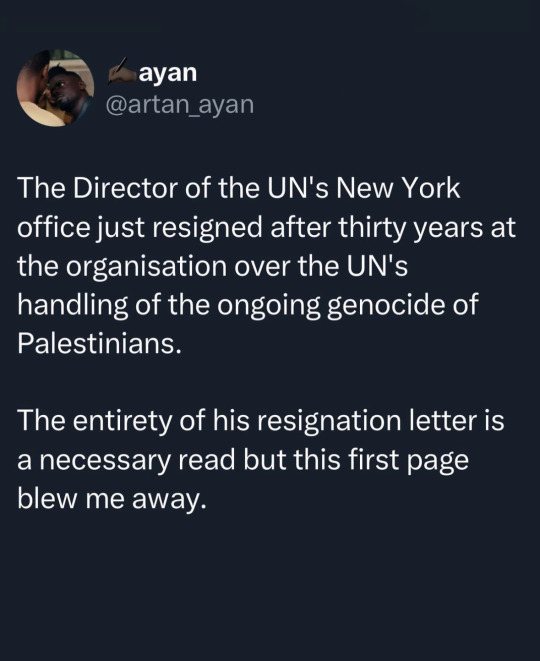
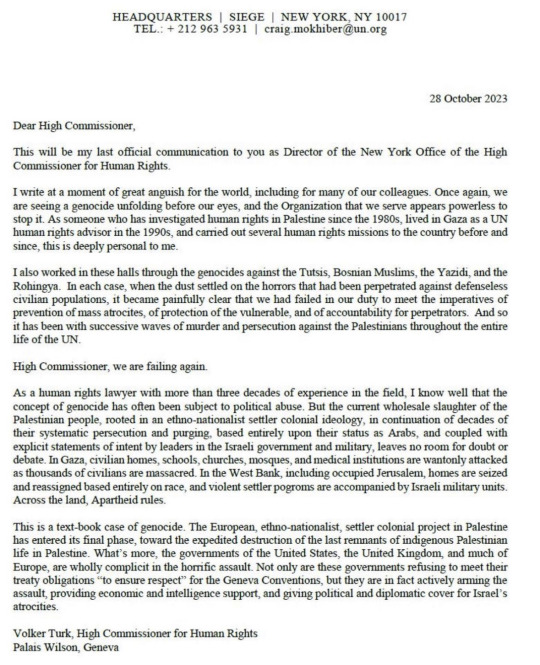
Dear High Commissioner,
This will be my last official communication to you as Director of the New York Office of the High Commissioner for Human Rights.
I write at a moment of great anguish for the world, including for many of our colleagues. Once again, we are seeing a genocide unfolding before our eyes, and the Organization that we serve appears powerless to stop it. As someone who has investigated human rights in Palestine since the 1980s, lived in Gaza as a UN human rights advisor in the 1990s, and carried out several human rights missions to the country before and since, this is deeply personal to me.
I also worked in these halls through the genocides against the Tutsis, Bosnian Muslims, the Yazidi, and the Rohingya. In each case, when the dust settled on the horrors that had been perpetrated against defenseless civilian populations, it became painfully clear that we had failed in our duty to meet the imperatives of prevention of mass atrocites, of protection of the vulnerable, and of accountability for perpetrators. And so it has been with successive waves of murder and persecution against the Palestinians throughout the entire life of the UN.
High Commissioner, we are failing again.
As a human rights lawyer with more than three decades of experience in the field, I know well that the concept of genocide has often been subject to political abuse. But the current wholesale slaughter of the Palestinian people, rooted in an ethno-nationalist settler colonial ideology, in continuation of decades of their systematic persecution and purging, based entirely upon their status as Arabs, and coupled with explicit statements of intent by leaders in the Israeli government and military, leaves no room for doubt or debate. In Gaza, civilian homes, schools, churches, mosques, and medical institutions are wantonly attacked as thousands of civilians are massacred. In the West Bank, including occupied Jerusalem, homes are seized and reassigned based entirely on race, and violent settler pogroms are accompanied by Israeli military units. Across the land, Apartheid rules.
This is a textbook case of genocide. The European, ethno-nationalist, settler colonial project in Palestine has entered its final phase, toward the expedited destruction of the last remnants of indigenous Palestinian life in Palestine. What's more, the governments of the United States, the United Kingdom, and much of Europe, are wholly complicit in the horrific assault. Not only are these governments refusing to meet their treaty obligations "to ensure respect" for the Geneva Conventions, but they are in fact actively arming the assault, providing economic and intelligence support, and giving political and diplomatic cover for Israel's atrocities.
Volker Turk, High Commissioner for Human Rights Palais Wilson, Geneva
Full letter
2K notes
·
View notes
Text
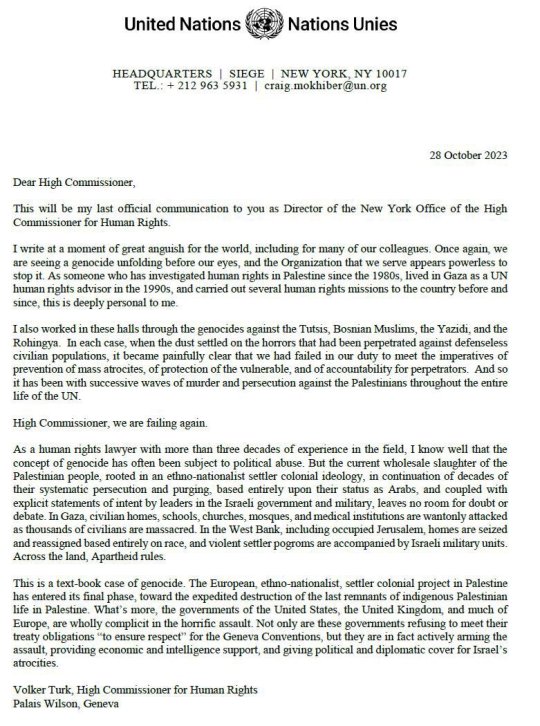
You MUST READ and disseminate the resignation letter of the High Commissioner for Human Rights, which speaks of a comprehensive plan for annihilation/genocide.
This resignation letter and message were written three days before the Jabaliya Massacre, in which many children and women tragically lost their lives!
You can read it from the image, or I will provide you with the text below to make it easier for you to read.
28 October 2023
Dear High Commissioner,
This will be my last official communication to you as Director of the New York Office of the High Commissioner for Human Rights.
I write at a moment of great anguish for the world, including for many of our colleagues. Once again, we are seeing a genocide unfolding before our eyes, and the Organization that we serve appears powerless to stop it. As someone who has investigated human rights in Palestine since the 1980s, lived in Gaza as a UN human rights advisor in the 1990s, and carried out several human rights missions to the country before and since, this is deeply personal to me.
I also worked in these halls through the genocides against the Tutsis, Bosnian Muslims, the Yazidi, and the Rohingya.
In each case, when the dust settled on the horrors that had been perpetrated against defenseless civilian populations, it became painfully clear that we had failed in our duty to meet the imperatives of prevention of mass atrocites, of protection of the vulnerable, and of accountability for perpetrators. And so it has been with successive waves of murder and persecution against the Palestinians throughout the entire life of the UN.
High Commissioner, we are failing again.
As a human rights lawyer with more than three decades of experience in the field, I know well that the concept of genocide has often been subject to political abuse. But the current wholesale slaughter of the Palestinian people, rooted in an ethno-nationalist settler colonial ideology, in continuation of decades of their systematic persecution and purging, based entirely upon their status as Arabs, and coupled with explicit statements of intent by leaders in the Israeli government and military, leaves no room for doubt or debate. In Gaza, civilian homes, schools, churches, mosques, and medical institutions are wantonly attacked as thousands of civilians are massacred. In the West Bank, including occupied Jerusalem, homes are seized and reassigned based entirely on race, and violent settler pogroms are accompanied by Israeli military units. Across the land, Apartheid rules.
This is a text-book case of genocide. The European, ethno-nationalist, settler colonial project in Palestine has entered its final phase, toward the expedited destruction of the last remnants of indigenous Palestinian life in Palestine.
What's more, the governments of the United States, the United Kingdom, and much of Europe, are wholly complicit in the horrific assault. Not only are these governments refusing to meet their treaty obligations to ensure respect" for the Geneva Conventions, but they are in fact actively arming the assault, providing economic and intelligence support, and giving political and diplomatic cover for Israel's atrocities.
Volker Turk, High Commissioner for Human Rights Palais Wilson, Geneva
#gaza#palestine#gaza strip#free gaza#free palestine#storiesfromgaza#غزة#فلسطين#genocide#humanitarian crisis
1K notes
·
View notes
Text
Astrology notes

Reminder. When reading, take into account your entire natal chart.Thank you for the feedback⸜(。˃ ᵕ ˂ )⸝♡
People with the Moon conjunction/trine/sextile Jupiter are very friendly. I will not say that they immediately seem cute at first impression (you need to watch the ascendant for this), but in further communication with them you feel their charisma and friendliness.It's very cozy with them!
I often discuss with people their natal chart and their complaints, and I noticed that people with Mercury square/opposition ascendant have certain features in terms of mind. For example, memory problems, or good long-term, but poor short-term memory, it is difficult for them to concentrate on several things at once, or on the contrary, they lack perseverance, it is difficult for them to assimilate new information. Their mind is not weak, just different from the usual one.Or I observe problems with speech (stuttering, burr, lisp, unusual accent)
Selena in the 3rd house, Mercury conjunct Venus/Mars, Venus in the 3rd house have very pleasant voices. Their voices are velvety, most often modal (chest)
Have you noticed how during the scorpio season all astrologers wrote posts on the topic of sex? It's all scorpio's vibe𖤐⭒๋࣭ ⭑
I read on one forum that the combination of the ascendant in Leo and the Sun/Venus in the 1st house gives a bright and sexy appearance. I'm not sure about sexuality, but their appearance is really very beautiful and unusual!
People with Lilith in the 4th house are more likely than others to think about moving to another city/country, and just to another place. In a change of environment, they can feel out of their comfort zone and self-development. If Lilith is amazed, then the person will want to move because of personal beliefs (most often because of politics)
It seems to me that the most important and cardinal thoughts come to our minds when transit houses return to natal houses (for example, the Sun in the 3rd house in the natal chart and the transit Sun in the 3rd house).It's like a personal new year in my head.You sum up your results, plan, create different options for the future. Ideas may come up that you haven't thought about before. Physically, nothing new is happening, the usual routine (home and study/work), but in a person's head there are huge independent (!!!) changes
Guys, whose strongest planet in the natal chart is the Moon, do you also f*cking feel every full moon and new moon?
People with the Moon in the 1st house, the ascendant in Cancer, the Moon in Cancer/4th house, the Sun in the 4th house need personal space. They can be very sociable and energetic, but they need at least 15 minutes of silence to distract themselves and be alone
Retrograde natal planets can be compared to a splinter that is stuck deep under the skin and you can't see where it can be pulled out. It's difficult, but it's possible. Retrograde planets can also be made less problematic, but it will take a lot of effort
Some underestimate the influence of stellium, believing that the ascendant, the sun and the moon are enough to understand a person.As practice shows, most often this is not enough, especially when the stellium and the Big Three are different in temperament.Please consider your stelliums
Mars in Sagittarius can look athletic even if they don't do sports
If you see a person who reads the news about maniacs, murders and crime, then there is a 90% chance that he has placements in Scorpio/8th house
Most content makers have strong placements in Leo/Aquarius/5th house/11th house. I'm talking about people who have been blogging for a long time and professionally, as well as whose work is related to the media sphere
Mercury in Virgo/6th house has a lively mind in conversation. They argue well, they discuss well, they can turn your words against you.They may respond sharply, but in fact
Often we may be attracted to the creativity or personality of some famous person because of similar placements in the natal chart
On the astro-seek website, you can guess the Sun/Moon/ascendant of a person from a photo. According to statistics, people with Scorpio/Aquarius in the Big Three have the least guessed photos. Still, I agree that these are the most mysterious signs of the zodiac
According to Ceres in the natal chart, you can learn about the upbringing of a person (since this asteroid shows the connection between parents and a child).For example, Ceres in the 5th house indicates a creative child. He could come up with a lot of games, drew a lot, and behaved a little differently than other children. He could love to read or listen to fairy tales.Good imagination, but perceives visual information best
It seems to me that people with the Moon square/opposition Saturn/Uranus/Neptune/Pluto are more likely than other people to wind themselves up. These people perceive emotions, events, people deeply. They have high emotional intelligence, but it is often difficult for them to turn off their head and calm down from thoughts
#astrology#astrology community#zodiac#horoscope#astrology blog#astrology signs#tumblr fyp#astro community#natal chart#astro observations#natal astrology#ascendant#astrologer#astro notes#natal chart observations#fyp
831 notes
·
View notes